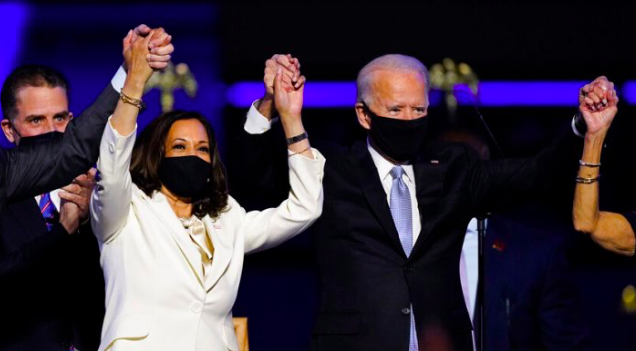The Joe and Kamala Cavalry
As democracy declares the end of a one-term eternity, the world rejoices.

AP
Lisa Van Dusen/For the Hill Times
November 12, 2020
As the world heaved a sigh of relief on Saturday with Joe Biden and Kamala Harris declared the projected president and vice-president-elect of the United States, just the prospect of a change in Washington had the church bells of Paris pealing and scores of the post-election petrified flinging off their covers at 11:30 a.m. as Twitter exploded and vaulting out of bed like Scrooge on Christmas morning.
“Let us be the nation that we know we can be,” Biden told a rapturous crowd in Wilmington, Del., Saturday night, transmuting the horror of the past four years into an aspirational exhortation.
On Jan. 20, 2021, America will once again have a sane, trustworthy, competent, empathetic, patriotic president and vice-president who will govern based not just on what’s good for them, but also for their fellow citizens and the rest of the world.
The mood on the streets of America on the weekend was reminiscent of the outpouring when Barack Obama was elected in 2008, both in Chicago on election night and in Washington on Inauguration Day. As a sequel to that moment, it looked more like liberation and salvation, as though America had not just made a statement of identity and values but averted an existential disaster. It combined the massive relief of an end to the daily deluge of toxicity out of the White House, the change of a president whose character represents a net gain in stable political content and the hope of a vice-president who will be a role model for children around the world, the way Obama has been, of what power looks like. Harris is also a brilliant tribute to the role Black women have played not just in this election, but in the story of America and in our collective political life.
Harris is also a brilliant tribute to the role Black women have played not just in this election, but in the story of America and in our collective political life.
It’s “our” political life because in the 21st century, all politics are global, and America remains—despite the relentless efforts of the same interests who deployed Trump as a one-man democracy wrecking ball and American disrepute machine—the political content sphere around which the rest of the world orbits. It did not take a deadly pandemic to prove humanity’s interconnectedness, especially in the age of instant collective enlightenment, love, hate, and outrage.
There will be those trying to frame Biden’s victory as not his to claim, as a less significant development and less likely catalyst for change than it really is. “The lunatic is dead, long live the lunacy” post-mortems already surfacing presage a retrenchment by anti-democracy interests to maintain the daily level of damage that Trump was able to deliver using more diffuse messengers. That will be much harder with Biden and Harris as the world’s primary political content providers.
Among their missions will be to seek to prevent the authoritarian-adjacent nonsense of the past four years from ever happening again. Luckily, Trump’s exploitation of American democracy’s un-plumbed loopholes has revealed those weaknesses as a blueprint for institutional reform. After so much industrialized nonsense, there’s something to be said for clarity.
In their speeches in Wilmington on Saturday night, Biden and Harris presented an end to rambling belligerence and a return to world-reassuring, principled coherence. They spoke like competent, empathetic public servants and as the avatars of a hundred stories of struggle, aspiration, self-determination, loss, redemption, and achievement of all the names and faces across the globe who created them and propelled them to this moment.
Above all, they put forth a belief in both democracy and politics as forces for good to be protected and practiced with integrity, trust, and authenticity. You can almost feel the soul of America, and countless others around the world, thanking them.
Lisa Van Dusen is associate editor of Policy Magazine and a columnist for The Hill Times. She was Washington bureau chief for Sun Media, international writer for Peter Jennings at ABC News, and an editor at AP in New York and UPI in Washington.
